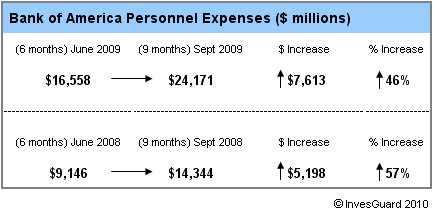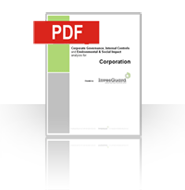-
Advantages of SubscriptionSubscription provides you the right to use all 3 levels of data.
The third and most detailed level of data which is available only to subscribers provides the most comprehensive explanation of the rating profile of companies in our database. It will provide you with information on why we think the Board Effectiveness of a company is weak or why the Audit Committee of a company can probably do better. This information may be that key element that you need over and above critical financial data to give you a complete corporate picture.
For additional information on why you should use InvesGuard please click here.
blog:
Guarding Investments one post at a time
Part II- Adventure Sports: Diving Deep Into Compensation
In our bid to better prepare ourselves for the barrage of compensation related data that is sure to unfold soon, we have started reviewing 2009 compensation data for banks in the hopes that the final picture will not necessarily give us a stroke!

Yesterday, we covered JP Morgan Chase and today it is the turn of Bank of America.
For 9 months ended Sept 2009, personnel expense was $24,171 million, whereas for the same period in 2008 it stood at $14,344 million. This increase of $9,827 million is part of the total indirect expense increase and has been attributed to the acquisition of Merrill Lynch and Countrywide which increased various expense categories. But what is interesting to see is the rate of increase in personnel expenses in the 3rd quarter over the 2nd quarter is only slightly higher than the increase in the same period in 2008.

That said, the total increase in personnel expenses for 9 months ended 2008 to same period 2009 is close to 70%. This can imply that most of the increase attributable to the Merrill and Countrywide takeover happened in the first 1 or 2 quarters of 2009 and subsequently, lay-offs or other separation type events reduced the net increase as a result of the Merrill and Countrywide takeover. As a corollary of this, one can assume that fourth quarter personnel expenses will not be substantially different from the third quarter barring of course any bonus amounts and incentive related amounts paid out.
The bright spot of course is the relative lower percentage increase in personnel expenses in 2009 as compared to the same period in 2008.
Naturally, Bank of America cannot go mentioned without talking about Paymaster Kenneth Feinberg’s special ordinances for this company. In November 2009, Joe Price and Barbara Desoer (Chief Financial Officer and President, Bank of America Mortgage, Home Equity and Insurance Services) had their base salaries reduced with retroactive (November 2009) effect. As per the amendments, Joe Price had his salary reduced from $800k to $500k and was awarded $5.25 million in salary stock award units. Barbara Desoer had her salary reduced from $800k to $500k and was awarded $3.95 million in salary stock unit awards. Mind you, although they are called ‘stock units’, these salary ‘stock units’ are paid in cash, based on the Corporation’s stock price on each payment Date. The agreement stipulated that if repayment were to occur, (which did happen soon after this ordinance), all Salary Stock Units that would have become payable within the one-year period following this repayment date would be paid on the repayment date, and the Payment Dates for all remaining Salary Stock Units shall be accelerated by one year. It is not clear whether after repayment, salaries go back to original values or not, but we will soon know.
Then there was the matter of now ex CEO Kenneth Lewis’ salary and compensation. After oscillating between being the darling of Wall Street for orchestrating the Merrill takeover and being the scapegoat for the subsequent fiasco, Kenneth Lewis agreed to forgo his salary and bonus for 2009 and also negotiated a lower exit package.
From a governance standpoint, some good changes have taken place in BofA’s boardroom primarily, getting some good candidates onboard who have relevant experience and can take a fresh look at the company. In addition, naming a CEO was another step in the right direction and one can only hope that Massey and Co. will take a closer look at succession planning in the future.
Wednesday
January 13
Adventure Sports: Diving Deep Into Compensation.
With all the bank compensation hoopla going on, I thought it would be a good idea to see where banks stood with their compensation figures for 2009.
It’s JP Morgan Chase for today.
Having exited the TARP program quite a while back, it has been free to independently determine its compensation amount and structure as compared to some of the other banks that took till the end of 2009 to do so.
Reviewing JP Morgan’s Form 10k for 9 months ended September 2009, showed markedly increased compensation expense as compared to the same period in 2008. Compensation expense for this 9 month period stood at $ 21816 million as compared to $ 17722 million in 2008. JP Morgan attributes this increase of 23% to the takeover of Washington Mutual and an increase in performance based compensation.
In JP Morgan’s Investment Bank, compensation for the 9 months ended September 2009 has also increased from $6535 million to $ 8785 million. Investment bank compensation increase constitutes almost 55% of the total compensation increase during the 9 months of 2009. Also, investment bank compensation as a percentage of its total revenue for the 9 months ended Sept 2009 stood at 37% a steep drop from 53% for the same period in 2008……probably a good thing too.
JP Morgan appears unperturbed by Goldman Sachs and Morgan Stanley announcing their new stock based bonus plans for top executives. Stock based compensation as per JP Morgan’s 10K stands at $ 2435 million, a modest increase from $ 2085 million for 2008. Any increase here could be considered a step in the right direction.
CEO James Dimon like Goldman’s Blankfein will continue to receive a salary and a bonus (though bonus in all probability will not be in pure stock). With the entire investor world and Main Street USA focused on bank compensation, it should be interesting to watch how these banks balance to keep their employees happy while warding off public focus.
Monday
January 11





